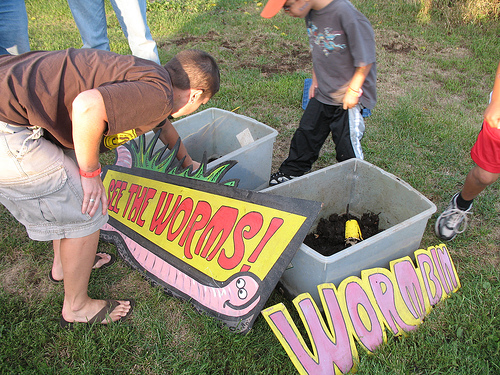Before there were waste receptacles, trash collectors, landfills and islands of garbage the size of Texas, people burned, buried, refurbished or repurposed their unwanted goods. Pre-industrial revolution, these items were mostly natural and biodegradable. They had, and still have, many other uses.
Unfortunately, once an item is deemed garbage, it's sentenced to the landfill today more often than not. It's a kiss of death for the multiple afterlives it could have had. I'm not talking solely about creative feats such as fashioning purses out of twinless mittens. Nor the perfectly edible, prepared foods that can be fed to the needy, like those City Harvest salvages in NYC. With natural items such as food scraps and yard debris, the obvious afterlife is natural also: to biodegrade, and give life to new plants with nutrient soil.
Or is it obvious, anymore? By weight, food scraps nowadays comprise the largest component of the waste stream in America. We live in an age where it is perfectly acceptable to toss uneaten foodstuffs and wilted flowers along with non-recyclables to spend their dank days on earth decomposing at a glacial rate. By comparison, composting food scraps involves manipulation to increase the rate of decomposition, producing ready-to-use soil in as little as 6-8 weeks.

As an urban, single-person householder with no outdoor space to call my own, I have little use for such soil. As an avid home cook, I do create a small shrine of peels, stalks, skins and wilted leaves each week, though. Home composting can have a scary ring to it -- you have to have the space, temperature control, and a handful of earthworms helps! No, instead of going that route, I take my food scraps to the community compost drop-off while running my weekend errands. When there isn't time, I'll shove the airtight container or plastic bag of the stuff into the freezer, to keep it from smelling in the meantime. There's not a huge learning curve to it, but it's a habit that takes a little dedication and time. Habit is only an antecedent of belief, anyhow, and if one believes that food scraps don't belong in the trash can, as most people think their Christmas wreaths should not go either, then the practice follows.
Most of the time, we have to be aggressively taught to throw out the things we do. There is little instinctual about tossing a piece of food into a bag and bringing it outside for collection. Sure, if something smells fetid, the immediate reaction is to get rid of it, fast. But the rest is evidently subjective. My family friends once had a good laugh over the naivete of their their two or three-year-old son: when spoons began disappearing from the household, the parents wondered where they had all gone. Then they spotted the toddler calmly tossing his individually-sized yogurt carton into the trash bin -- along with the metal spoon. My grandfather was a strident proponent of his kitchen garbage disposal; everyone knew that if any foodstuff, even bones, were given to the trash, there would be hollers heard throughout the house.
What I guess I am saying with all this is that disposal practices are constantly being preached, learned, followed and un-learned with little fanfare for all types of waste. Recycling paper and bottles seems common sense, or at least taboo when it is not done. So why the collective grudge over separating compostable kitchen waste from the rest? Yard waste recovery has increased substantially over the last decades. But food scrap recycling, or composting, has made little headway in comparison. Today's toddlers may seldom witness, and therefore really understand, the natural genesis from plant matter to earth given today's standards of food waste.
Shifting gears, and separating compostable waste from the rest, can be a sudden, decided change from one household to the next. It may seem impractical from the beginning. There may be logistical hurdles, such as no handy composting drop-off location in your community, so creating public demand for this could be a first step. On the other hand, you may find composting for your own backyard garden needs rewarding, even fascinating. It can all happen right now. Let's change the way we look at food waste to begin.